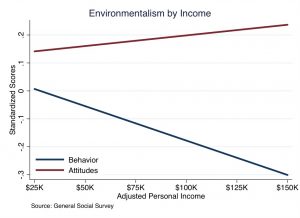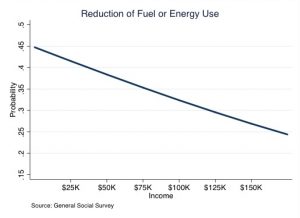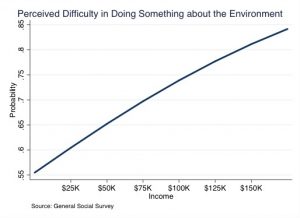
Is Environmentalism for the Rich?
During a course at UMD, I was able to (begin) to explore environmentalism’s intersections with class.
Environmental sociologists have tried to measure and understand levels of concern for the environment and environmental behaviors in an attempt to understand how to create environmental change. One major question in environmental sociology concerns the relationship between class and environmentalism. Some research shows that wealthier individuals care about the environment more, potentially because caring about the environment is a luxury only afforded to those who have met other needs. In addition, some policymakers and scholars have relied on the assumption that environmental concern is a luxury afforded only to residents of wealthy nations (Dunlap & York 2008).
On the other hand, poor people and people of color are more often exposed to environmental harm and degradation, and therefore may be more concerned about environmental issues because of their direct exposure to environmental problems (see Bullard 1990, Downey 1998, Norgaard 2006, Taylor 2009 and many others on environmental justice). It is important to separate concern for the environment from environmental behavior in order to clarify this relationship.
To answer this question, I created separate index variables of measures of environmental behavior and environmental attitudes using data from the 2010 General Social Survey. The General Social Survey is a large, nationally-representative survey conducted by the National Opinion Research Center at the University of Chicago. In 2010, this survey included a module focusing on environmental issues. I created two index variables measuring environmental concern and environmental behavior. All variables were recoded so that higher values indicate a more pro-environmental stance or behavior.
Behavior measures include:
- Reduction of use of fuel or energy
- Recycling
- Donating money
- Signing environmental petitions
- Reduction of driving
- A general measure of behaviors intended to “help the environment”
Attitude measures include:
- Opinions on importance of environmental issues in relation to the economy
- General concern about the environment
- Whether or not it is too difficult for the respondent to do anything about the environment
- Willingness to accept a cut in standard of living in order to help the environment.
These index variables were then standardized and included in models with inflation-adjusted personal income. These models controlled for race, sex, education, age, region, and score on a 10-word vocabulary test. Logistic regression models were used to examine individual components of the index variables.
I compare personal income to these concern and behavior measures using linear regression. Environmental behavior actually becomes less frequent on average with increasing income, while income is not significantly related to environmental concern. Controlling for age, gender, race, education, region, and vocabulary score, income has a negative relationship with environmental behavior (Figure 1).

Figure 1: Regression of standardized environmental behavior and environmental concern indices with adjusted personal income.
I also find that income does not have a statistically significant relationship with environmental concern, even when using concern measures directly contrasting environmental protection with economic issues (Figure 1). Most environmental behaviors are not significantly related to income. However, higher incomes are associated with decreased likelihood of reducing fuel or energy use (Figure 2) and driving, on average. The only measure of environmental concern that relates significantly to income is a measure of perceived difficulty (Figure 5).

Figure 2: Logistic regression of reducing fuel use with adjusted personal income.

Figure 3: Logistic regression of perceived difficulty of doing something to help the environment with adjusted personal income.
This could indicate that wealthier people may be less willing to perform environmental behaviors. These results highlight the complicated relationship between environmentalism and class and challenge assumptions about the relationship between class and the environment. Overall, there is not a straightforward relationship between income and environmental behaviors and attitudes. In fact, wealthier individuals seem to be less likely to engage in pro-environmental behaviors, despite being more likely to report that it would be less difficult for them to do so. This challenges the narrative that caring about the environment is a luxury, and instead may indicate that wealthier individuals are less willing to take action on behalf of the environment.
People with economic privilege have increased ability to affect social/environmental change. The fact that they may be less likely to participate is concerning. This also provides interesting context to the important and useful discussions about race and class in the environmental movement and the inclusion of environmental justice frames in “mainstream” environmentalism. Future research that could explore predictors of participation in different facets of environmental activism (such as protecting wildlife, hazardous waste, and climate change) is needed, as is research that examines pathways to movement participation.
References
Bullard, R. D. (1990). Dumping in Dixie: Race, Class, and Environmental Quality. Boulder, CO: Westview.
Downey, Liam. 1998. “Environmental Injustice: Is Race or Class a Better Predictor.” Social Science Quarterly 79:766-778.
Dunlap, R. E., & York, R. (2008). The globalization of environmental concern and the limits of the postmaterialist values explanation: Evidence from four multinational surveys. The Sociological Quarterly, 49(3), 529-563.
Norgaard, Kari Marie (2006). ‘We Don‘t Really Want to Know‘ Environmental Justice and Socially Organized Denial of Global Warming in Norway. Organization and Environment 19(3): 347-70.
Taylor, Dorcetta. 2009. The Environment and the People in American Cities, 1600s-1900s: Disorder, Inequality, and Social Change. Durham, NC: Duke University Press.
Featured image found at peoplesclimate.org